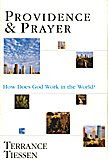
Greg Laughery is the director of L'Abri Fellowship, a small English-speaking community nuzzled in the breathtaking Swiss Alps. It is a shelter and a home away from home for many, myself included. I spent the past year living and working at L'Abri and had the privilege to co-edit Dr. Laughery's latest book, Living Apocalypse. As a commentary on the book of Revelation, Living Apocalypse is highly accessible. It is not a book for the Bible scholar alone, although Bible scholars will not be bored. This commentary is beneficial to all. It is a relevant-to-life commentary, hence the title, but it isn't soft; it doesn't sacrifice hermeneutics.
If you find the book of Revelation intimidating or irrelevant, I encourage you to pick up Living Apocalypse and read it side-by-side with the text. Laughery helps his reader digest the biblical text passage by passage by providing the mainstream interpretations as well as his professional assessments. The symbolism in Revelation is perhaps what makes the text so highly difficult, which is why I find this book highly helpful. Laughery does an excellent job putting the Apostle's word-pictures into perspective by providing the historical context of John's time, the escatalogical application based upon the hermeneutic of the entire book, indeed the whole of Scripture, and the significance the text has for our everyday living.
It is this idea, aptly expressed by the title, that I like most about this book. The word 'living' serves both as an adjective and a verb. The Apostle John's Apocalypse is a living revelation, and as such, those who have been born again by and in the Word respond to his word by living it. Laughery encourages his readers that the book of Revelation is relevant to how we live our lives now. Again, this is what I find most valuable and most singular about Living Apocalypse. Greg Laughery's deep, genuine love and care for people is not only evident in his many years of service at L'Abri, it also manifests itself in his books. Living Apocalypse goes above and beyond the call of most commentaries by engaging the heart, as well as the mind. It connects the heart of the text to the heart of the reader, and thereby the heart of the reader to the heart of God -- having at its heart, a cyclical growth in mind.
If you find the book of Revelation intimidating or irrelevant, I encourage you to pick up Living Apocalypse and read it side-by-side with the text. Laughery helps his reader digest the biblical text passage by passage by providing the mainstream interpretations as well as his professional assessments. The symbolism in Revelation is perhaps what makes the text so highly difficult, which is why I find this book highly helpful. Laughery does an excellent job putting the Apostle's word-pictures into perspective by providing the historical context of John's time, the escatalogical application based upon the hermeneutic of the entire book, indeed the whole of Scripture, and the significance the text has for our everyday living.
It is this idea, aptly expressed by the title, that I like most about this book. The word 'living' serves both as an adjective and a verb. The Apostle John's Apocalypse is a living revelation, and as such, those who have been born again by and in the Word respond to his word by living it. Laughery encourages his readers that the book of Revelation is relevant to how we live our lives now. Again, this is what I find most valuable and most singular about Living Apocalypse. Greg Laughery's deep, genuine love and care for people is not only evident in his many years of service at L'Abri, it also manifests itself in his books. Living Apocalypse goes above and beyond the call of most commentaries by engaging the heart, as well as the mind. It connects the heart of the text to the heart of the reader, and thereby the heart of the reader to the heart of God -- having at its heart, a cyclical growth in mind.







